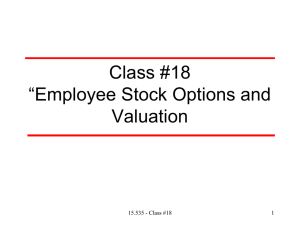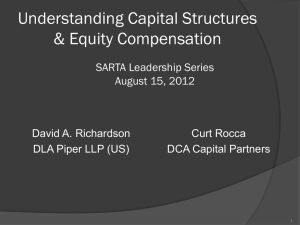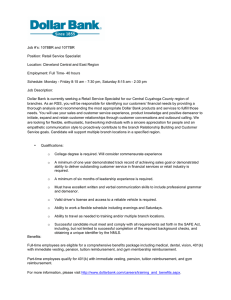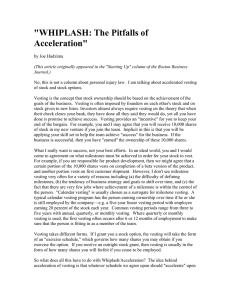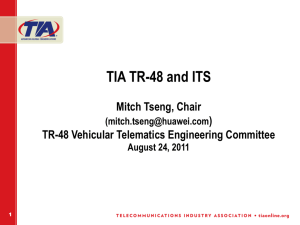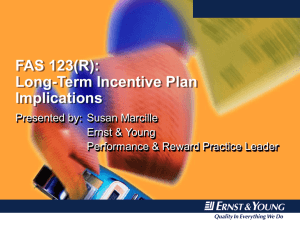"Take Stock When Using Stock in Trade Part Two: Stock and Options"
advertisement
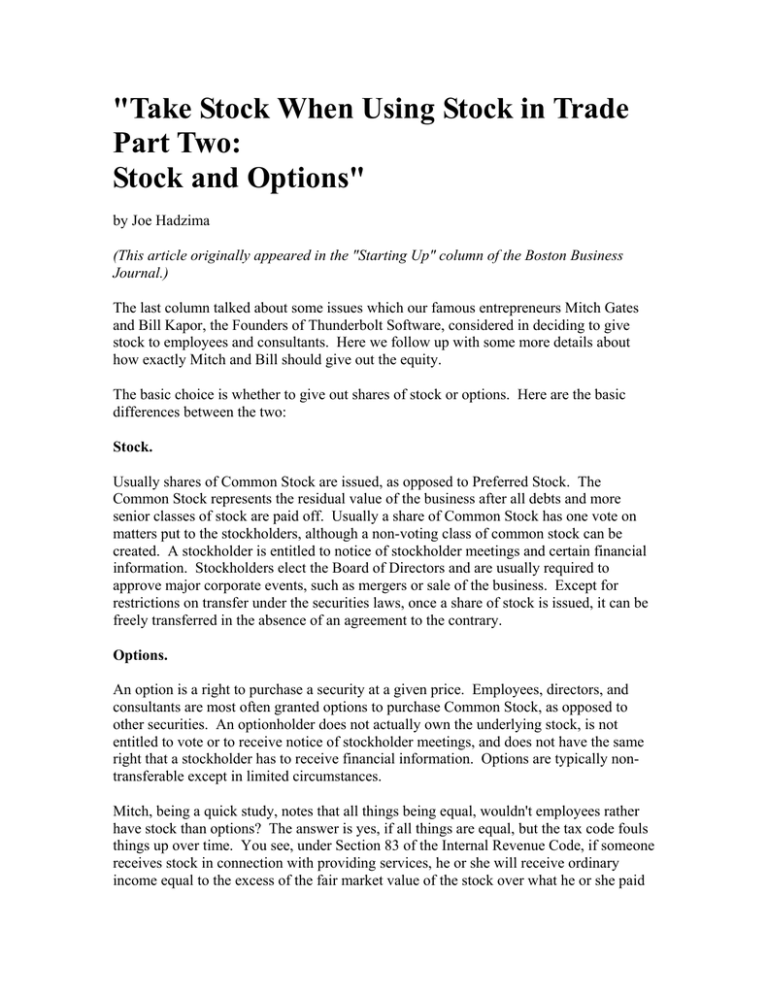
"Take Stock When Using Stock in Trade Part Two: Stock and Options" by Joe Hadzima (This article originally appeared in the "Starting Up" column of the Boston Business Journal.) The last column talked about some issues which our famous entrepreneurs Mitch Gates and Bill Kapor, the Founders of Thunderbolt Software, considered in deciding to give stock to employees and consultants. Here we follow up with some more details about how exactly Mitch and Bill should give out the equity. The basic choice is whether to give out shares of stock or options. Here are the basic differences between the two: Stock. Usually shares of Common Stock are issued, as opposed to Preferred Stock. The Common Stock represents the residual value of the business after all debts and more senior classes of stock are paid off. Usually a share of Common Stock has one vote on matters put to the stockholders, although a non-voting class of common stock can be created. A stockholder is entitled to notice of stockholder meetings and certain financial information. Stockholders elect the Board of Directors and are usually required to approve major corporate events, such as mergers or sale of the business. Except for restrictions on transfer under the securities laws, once a share of stock is issued, it can be freely transferred in the absence of an agreement to the contrary. Options. An option is a right to purchase a security at a given price. Employees, directors, and consultants are most often granted options to purchase Common Stock, as opposed to other securities. An optionholder does not actually own the underlying stock, is not entitled to vote or to receive notice of stockholder meetings, and does not have the same right that a stockholder has to receive financial information. Options are typically nontransferable except in limited circumstances. Mitch, being a quick study, notes that all things being equal, wouldn't employees rather have stock than options? The answer is yes, if all things are equal, but the tax code fouls things up over time. You see, under Section 83 of the Internal Revenue Code, if someone receives stock in connection with providing services, he or she will receive ordinary income equal to the excess of the fair market value of the stock over what he or she paid for the stock. At the early stages of a venture, the fair market value will be relatively low, so this is not a problem. But what if investors have just bought stock which values the company at several million dollars? In that case, the stock can be a disincentive in the short run because Mitch and Bill will have to say to the employee, "Congratulations, here are 1,000 shares which are currently worth $30,000, and you owe tax on the $30,000." Now it is true that Thunderbolt Software will get a tax deduction equal to the $30,000 required to be recognized as income, but most startup companies are in a loss position and the deduction can't be used currently. It's here that options start to come into play. I explain to Bill and Mitch that options are generally not subject to Section 83, and therefore the recipient does not have any taxable income when he or she receives the option. If the option is an incentive stock option, there is no income realized on exercise of the option, although the alternative minimum tax may apply in certain instances, and if the employee doesn't sell the stock until two years after the date of grant of the option and one year after the date of exercise, then the result will be capital gains instead of ordinary income. If the option is a non-qualified option (i.e., does not qualify as an incentive stock option), then the optionee recognizes ordinary income when he or she exercises the option. The amount of ordinary income is equal to the then fair market value of the stock minus the exercise price paid. But, Thunderbolt Software will get an income tax deduction for the amount of income recognized and this is a "non-cash" deduction; i.e., Thunderbolt doesn't have to pay any cash to get the deduction. So Bill and Mitch, as the value of Thunderbolt's stock increases, you most likely will be using more options with your employees and consultants. With options, the optionee controls the timing of the income tax event. Note that people usually do not exercise options unless there is a "cash out event" such as an initial public offering or a sale of the business, or unless the option will expire if it is not exercised. Types of Options. Tax law requires that an incentive stock option (ISO) can only be granted to employees, must be granted under a stock option plan approved by stockholders, must have an exercise price equal to the fair market value of the stock on the date of grant, and can not have a term of more than 10 years. In the case of a 10 percent stockholder, the price must be 110 percent of fair market value and the term cannot exceed five years. All other options are non-qualified options (NQOs). Thus, outside directors and consultants can only receive NQOs. Note that NQOs do not have to be granted at fair market value, making it possible, in effect, to give out "cheap stock." However, the difference between the fair market value and the exercise price is treated as compensation expense for book accounting purposes, thereby decreasing reported earnings. Although this may not be a problem in early years, it can have an impact at an initial public offering. Also, if the option price is too low, the IRS may claim that it is the equivalent of an outright stock grant. There are also potential state securities law "cheap stock" rules which have to be considered. Think through all of the issues before you grant below market options. Vesting/Exercisability. "Joe," say Bill and Mitch, "we plan to give out 1,000 shares each year to each of the key people. What do you think of that idea? It makes sense from a business viewpoint in that stock is only given if the key people are still working or involved with Thunderbolt." This idea is sound, but giving stock out each year is not very efficient because of the tax rules. For example, if I am an early employee, I am better off if I get 5,000 shares when the stock is worth $.01 per share as opposed to getting the stock each year as the value increases. Even if I get an option each year, the exercise price must be at least fair market value to make the option an ISO, and if the exercise price is less than fair market value, Thunderbolt will have the compensation expense and those other issues. A more efficient way is to grant all of the shares or the option upfront and make the ability of the employee to retain the equity "vest" over time. In the typical case, if the employee leaves Thunderbolt, then he or she will forfeit the portion of the equity which has not "vested." There are two basic types of vesting: milestone vesting and calendar vesting. Under milestone vesting, the ability to retain equity is dependent on the achievement of individual or group goals such as the shipment of a beta version of the product. Milestone vesting is rarely used since it is often difficult to define the milestones accurately, and goals tend to change over time, leaving the status of the equity unclear. A surrogate is calendar vesting, which says that if the person is still employed or actively involved with the company on a given date, then the equity vests. Here the theory is that if the person is not working out or contributing, then the company should be replacing the person anyway. Here are some points to consider in thinking about vesting: Section 83(b). Under Section 83 of the Internal Revenue Code, if Thunderbolt decides to issue stock subject to vesting, then the measurement date for determining the amount of income received is not the date of issuance of the stock, but rather the date that the vesting occurs. This can be a disaster since the whole purpose of giving the stock was to increase the value of Thunderbolt. There is a solution: an 83(b) election can be filed with the IRS to recognize the income on the issuance date instead of the vesting date. However, this election must be filed within 30 days of the date the stock is transferred to the person. Calendar Vesting Schedule. Calendar vesting is usually over a three- to five-year period. Vesting can be on an annual, quarterly, monthly or other basis. If you decide on annual vesting, be careful not to wait until the end of the year to fire an employee who is not working out. If you do so, you could then be subject to a claim that the main reason for the firing was to deprive the employee of the vesting. Quarterly or monthly vesting minimizes this effect. Acceleration of Vesting. What happens if there is five-year vesting and Thunderbolt is sold after one year? Does the employee become fully vested at the date of sale? If you decide to give stock instead of options, then the default is that the employee owns the stock unless you "divest" him or her on a sale. Under an option, the vesting is accomplished by an exercise schedule, i.e. on a given date the option is exercisable for a given number of shares. Therefore, with an option you have to provide for acceleration of the exercise schedule at the time of a sale if you want to make sure that the employee gets the full benefit of the option. Option plans usually give the Board of Directors flexibility either to accelerate an option fully or in part, to cancel the option at the sale, or to arrange for a carryover of the option with the acquiring company. This can be done on an option by option basis, so that the Board could, for example, partially accelerate options of employees who will not be staying on, and substitute acquiring company options for employees who will be continuing. Be sure to check out these issues with your accountants; there are some potentially tricky issues here. Appearances. Bill and Mitch were concerned that if Thunderbolt gives an employee stock which vests over five years then there is nothing "new" to give to the employee each year. We decided to issue 5,000 shares in five stock certificates of 1,000 each and "hold" the unvested portion. At the end of each year, Bill and Mitch will deliver the newly "vested" certificate to the employee, thus creating a tangible symbol of accomplishment. Bill and Mitch thought it was tough enough to design, build and sell their software. They didn't think that they would have to master these and other details of stock and options simply to "share the success" with their team. They don't have to become experts on the subject, but they do need to have a clear vision of what they want to accomplish and how they want to treat the team. With this vision, they can put the accounting and legal experts to work coming up with a plan which will navigate the technical shoals to produce the intended result. If Mitch and Bill go off blindly, then the Thunderbolt ship could very well run aground in unexpected ways with disastrous results. DISCLAIMER: This column is designed to give the reader an overview of a topic and is not intended to constitute legal advice as to any particular fact situation. In addition, laws and their interpretations change over time and the contents of this column may not reflect these changes. The reader is advised to consult competent legal counsel as to his or her particular situation.
